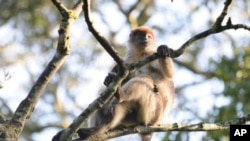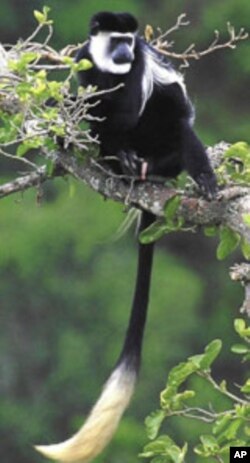African leaf eating monkeys could be “wiped out” by the end of the century as a result of global warming. A new British study says it could happen if annual temperatures rise by two degrees Celsius.
The study was conducted by researchers at Oxford, Bournemouth and Roehampton Universities, including Robin Dunbar, professor of evolutionary anthropology at Oxford.
“The problem that all species have really is time. You’ve got to schedule your daily needs – food finding, digesting…travel from one feeding site to another. And importantly for primates, time for your social friends, as it were, to create that sort of group bonding. All this has to be fitted into the day,” he says.
Time and heat
“Temperature,” he says, “has a big impact on how much time you have to commit to these activities and particularly to the question of whether you have to devote a lot of time to digesting your food, especially species that eat leaves.”
Dunbar says when the primates digest food they’re not doing much of anything else, especially when it’s hot.
They just end up having to spend so much time resting in order to handle this kind of problem and also to avoid heat load,” he says.
As temperatures rise significantly, for example two degrees Celsius, he says, “They’re just going to be wiped out, really a lot of them.”
Warming affects the primates in two ways.
“When temperatures just get very hot, then there comes a point where you just have to seek shade and go to sleep because any kind of activity is exhausting,” he says.
He compares it to humans taking a siesta or nap during the day. While resting or asleep, digestion takes place.
“Leaves are very difficult to get the nutrients out of. So you have to digest the leaf walls and a lot of this is done by bacterial action in the stomach.”
It’s a process of fermentation, similar to the way beer is made. But that means it’s very susceptible to temperature change.
“If you do anything at all that causes your body heat to rise, the bacteria simply die out or go to sleep. They can’t cope with it. So you have to rest, which means you can’t go off foraging for more food. You can’t even engage in social interaction with your friends and relations,” he says.
Most at risk
Of the African leaf eating monkeys at risk, the colobine are in the most danger. Researchers suspect some Asian monkeys are at similar risk, but there’s a lack of data on them at this time.
It could take until the end of the 21st Century for the species to die out – an estimate based on current computer climate model forecasts.
“Global temperatures will be somewhere between two and four degrees Celsius higher. Even with two degrees, most of these African species are going to be hammered very badly. With four degrees, pretty much everybody is going to be in trouble,” he says.
The Oxford professor says climate change is coming, whether it’s man-made or a natural occurrence. “In the end it’s going to hit us whether we like it or not,” he says.
Relocation
“So, what we kind of have to ask ourselves are the national parks and reserves, where particular species at risk are common, well placed for the future? Should we perhaps look at areas which might be more suitable? Because what will happen is the forested zones will move away from the equator. They’ll move north and south,” he says.
Placing endangered specials in different zones may help to ensure their survival.
One example in Africa where climate change has drastically affected a species is the Gelada baboon. The animal now only lives on mountaintops in Central Ethiopia.
“It’s a spectacular lion-like animal with a wonderful fluffy cape and so on. Now this species used to be common all over Africa,” he says, “until about a hundred thousand years ago. And then climate warming has just forced it up onto the top of these mountains.”
The study says even if the problems of deforestation and hunting, which also threaten extinction, are resolved, it still may not be possible to save the primates.






